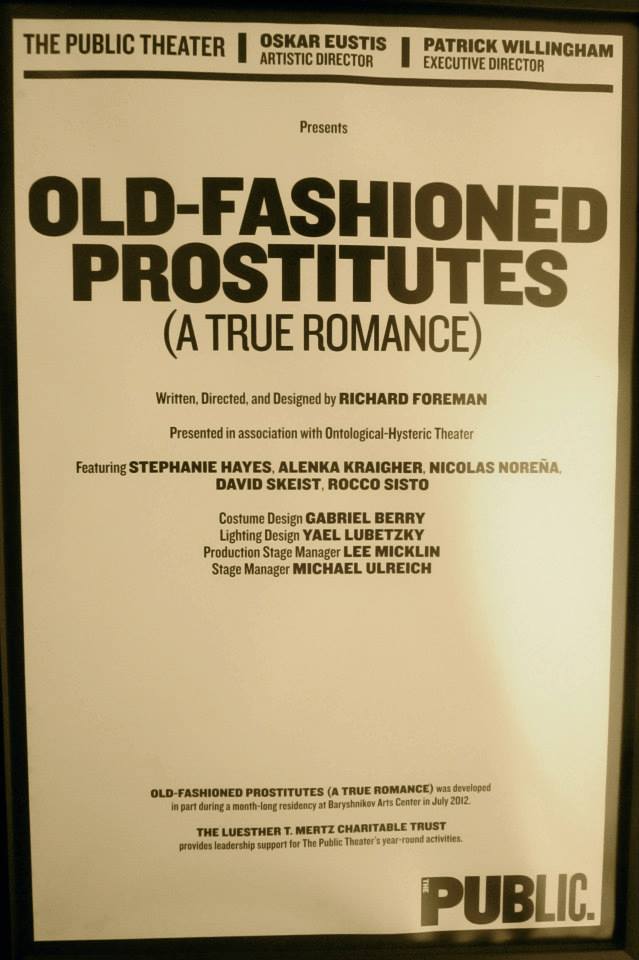It has been a good long while since I’ve seen a Richard Foreman play, and not only because he has himself been in a hiatus from the stage. My tolerance for his work has always been respectful, but limited, comprehending of his value and historical importance, but feeling that a shot of his essence here and there (or now and then) was enough. In truth, I am not sure which of his plays I have seen, or even how many, and wonder in retrospect if it was more than one or two. Now he has re-emerged at the Public Theatre, like a cicada of the avant-garde, and seems like any recurrent phenomenon to be indispensable to the cyclical movements of nature, or culture, as the case may be.
OLD-FASHIONED PROSTITUTES (A TRUE ROMANCE) is recognizable as Foreman, with a gnomic text more epic than enacted, and its delivery oddly vacant and automaton. The actors speak with greater coloration and individuation than I would have expected, but they are still subsumed, Borg-like, by an aesthetic that questions the possibility of a self-actualized personality. This is not meant as negative criticism, because if one sees an aesthetic as a surrogate for culture, what Foreman confronts us with is the realization that we are all absorbed by the rhythms and ways of our cultures, whether we conceive of it as Marx’s “second nature”, Gramsci’s “hegemony”, or Foucault’s “episteme”. Those are all philosophic concepts of the left, but the ideological basis of the particular culture makes no difference: ideology by its nature makes of us its own right hand.
That, at least, is one way of justifying what might otherwise be condemned as a dehumanizing tendency in Foreman; it seems so because we have been dehumanized in a different way by our own culture, and the foremen behind it. The mad appear mad when looked at by the sane, but as they gaze upon us – and Foreman’s actors are always doing this – the values are reversed and the terms of discussion upended. This seems to me to be what OLD-FASHIONED PROSTITUTES is ultimately about, and if there is a critical reservation therein it is that this proceeds more from the style than from the text, which has something to do with an older man’s recollection of past sexual encounters.
The attic trunk costuming, the whole faded whorehouse Joseph Cornell box of a set, the whimsically autographed photographs of historical luminaries on the walls, the weird conversation pieces (like a cotton festooned strawberry with a dozen or so nails hammered into it), the general ambiance of decadence and titillation, remind us of what hasn’t changed since the Surrealists suggested that only through dreams can we begin to make the constructed world around us our own. The Public Theater’s artistic director notes in the program that the point of Foreman’s work is to “shock us into a state of truer perception.” So it is, and I must agree that he, and his controlled, admirable, always present actors – David Skeist, Stephanie Hayes, Alenka Kraigher, Rocco Sisto, and Nicolas Noreña – have done just that.
